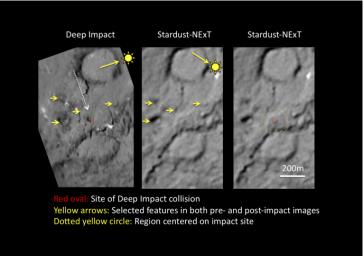
|
Comet Tempel 1 Six Years Later
- Click the image above for a larger view
- Full-Res JPEG (1434 x 1012) (113.8 kB)
- Full-Res TIFF (1434 x 1012) (4.4 MB)
Caption:
This image shows the surface of comet Tempel 1 as seen before and after NASA's Deep Impact mission sent a probe into the comet in 2005. The region was imaged by Deep Impact before the collision (left), then six years later on Feb. 14, 2011, by NASA's Stardust-NExT mission, which flew by the comet, snapping pictures along the way (middle and right images).
The white arrow shows the trajectory of the impact probe, and the red oval shows the area of impact, based on the trajectory data. The large yellow arrows show the location of the sun, while the little yellow arrows show selected features in the both the pre- and post-impact images. The yellow dotted circle shows the region of the impact site.
Scientists are still analyzing the disturbance to the surface on comet Tempel 1 where the Deep Impact collision occurred.
Background Info:
Stardust-NExT is a low-cost mission that is expanding the investigation of comet Tempel 1 initiated by NASA's Deep Impact spacecraft. NASA's Jet Propulsion Laboratory, a division of the California Institute of Technology in Pasadena, manages Stardust-NExT for the NASA Science Mission Directorate, Washington, D.C. Joe Veverka of Cornell University, Ithaca, N.Y., is the mission's principal investigator. Lockheed Martin Space Systems, Denver, built the spacecraft and manages day-to-day mission operations.
For more information about Stardust-NExT, please visit http://stardustnext.jpl.nasa.gov .
Cataloging Keywords:
| Name | Value | Additional Values |
|---|---|---|
| Target | 9P/Tempel | |
| System | Periodic Comets | |
| Target Type | Comet | |
| Mission | Stardust | Deep Impact |
| Instrument Host | Stardust | Deep Impact |
| Host Type | Sample Return | Impactor |
| Instrument | Navigation Camera (NC) | |
| Detector | ||
| Extra Keywords | Collision, Color, Dust, Impact | |
| Acquisition Date | ||
| Release Date | 2011-02-18 | |
| Date in Caption | 2011-02-14 | |
| Image Credit | NASA/JPL-Caltech/Cornell/Univ. of Maryland | |
| Source | photojournal.jpl.nasa.gov/catalog/PIA13869 | |
| Identifier | PIA13869 | |
